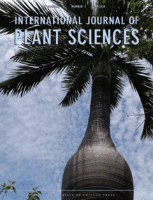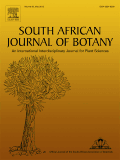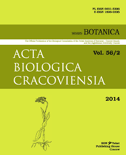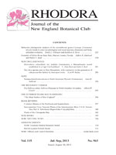
TURKISH JOURNAL OF BOTANY
Scope & Guideline
Exploring the depths of botanical knowledge.
Introduction
Aims and Scopes
- Plant Taxonomy and Systematics:
The journal emphasizes the classification and identification of plant species, including the description of new species and revisions of existing taxa. - Ecological and Environmental Studies:
Research focusing on the ecological aspects of plants, including their interactions with the environment, population dynamics, and conservation strategies. - Molecular Biology and Genetics:
Studies involving genetic analysis, phylogenetics, and molecular markers to understand plant evolution, diversity, and responses to environmental stresses. - Ethnobotany and Medicinal Plants:
Research exploring the traditional uses of plants, their pharmacological properties, and their significance in local cultures, particularly in Türkiye. - Plant Physiology and Biochemistry:
Investigations into physiological processes and biochemical pathways in plants, especially under stress conditions such as drought, salinity, and temperature fluctuations. - Fungal and Lichen Studies:
Research on fungi and lichens, including their taxonomy, ecology, and interactions with plant communities, reflecting the journal's breadth beyond just vascular plants.
Trending and Emerging
- Climate Change Adaptation in Plants:
An increasing number of studies are focusing on how plants adapt to climate change, especially concerning drought and salinity stress, highlighting the importance of understanding plant resilience in changing environments. - Genomic and Molecular Approaches:
There is a growing trend towards using genomic tools and molecular biology techniques to explore plant genetics, phylogeny, and responses to stress, indicating a shift towards more cutting-edge methodologies. - Conservation and Restoration Ecology:
Research on conservation strategies and restoration ecology is becoming more prominent, particularly studies aimed at preserving endemic species and understanding their ecological roles. - Bioprospecting and Phytochemistry:
An emerging focus on the discovery and characterization of bioactive compounds in plants and their potential applications in medicine and agriculture is evident, reflecting a broader interest in the utilitarian value of plant biodiversity. - Urban Ecology and Green Infrastructure:
The exploration of plant species within urban environments and their roles in green infrastructure is gaining importance, addressing the need for sustainable urban development and biodiversity conservation.
Declining or Waning
- Traditional Agricultural Practices:
Research on conventional agricultural practices, particularly those focused on older methods of farming and their ecological impacts, has seen a decline as newer research focuses on sustainable practices and innovative agricultural technologies. - Invasive Species Studies:
While initially a prominent topic, the focus on invasive species and their management has reduced, possibly due to a shift towards more localized conservation strategies and native species restoration efforts. - Historical and Archaeobotanical Studies:
There has been a noticeable decrease in papers focusing on historical botany and archaeological plant studies, suggesting a shift towards contemporary biodiversity and conservation issues.
Similar Journals

BOTANICAL REVIEW
Illuminating the complexities of botanical research.BOTANICAL REVIEW is a highly esteemed journal published by SPRINGER, renowned for its commitment to advancing the fields of Ecology, Evolution, Behavior and Systematics and Plant Science. Established in 1935, this journal has become a cornerstone for researchers and professionals, reflecting over eight decades of rigorous scholarship. With an impressive impact factor and ranking within the top quartile for both its fields—Q1 in Ecology, Evolution, Behavior and Systematics and Plant Science—BOTANICAL REVIEW remains a key platform for disseminating critical findings and fostering scientific dialogue. Although it is not an open-access journal, its accessibility through institutional subscriptions enhances its reach among the academic community. The journal not only emphasizes the ecological aspects of plant life but also integrates evolutionary context to inform current practices and theories in botany. With a dedication to exploring the complex interactions within botanical sciences, BOTANICAL REVIEW continues to shape the future of plant research.

INTERNATIONAL JOURNAL OF PLANT SCIENCES
Advancing plant knowledge for a sustainable future.The INTERNATIONAL JOURNAL OF PLANT SCIENCES, published by UNIV CHICAGO PRESS, is a leading journal dedicated to advancing knowledge in the fields of plant sciences and ecology. With an ISSN of 1058-5893 and an E-ISSN of 1537-5315, this journal has been a prominent platform for groundbreaking research since its establishment, featuring works from 1983 to present. It holds an impressive Q2 ranking in both Ecology, Evolution, Behavior and Systematics and Plant Science, reflecting its reputable standing within the academic community. The journal is well-regarded for its rigorous peer-review process and commitment to high-quality publication standards, making it a favored choice for researchers, students, and professionals eager to engage with the latest findings and innovative methodologies in plant research. While it does not currently operate under an Open Access model, the journal provides ample access options for institutions and individuals keen to explore its curated content. By presenting diverse studies that blend theoretical and practical insights, the INTERNATIONAL JOURNAL OF PLANT SCIENCES plays a critical role in fostering interdisciplinary dialogue and advancing the frontiers of plant science research.

Botanical Sciences
Empowering global collaboration in plant science.Botanical Sciences, published by SOC BOTANICA MEXICO, is a pioneering open access journal dedicated to advancing the field of plant science. Established in 2012, it has rapidly become an essential resource for researchers and professionals interested in the diverse aspects of botany, including plant biology, ecology, and conservation. With an ISSN of 2007-4298 and an E-ISSN of 2007-4476, the journal operates under a vision to foster the exchange of knowledge and innovations among scientists globally. Recognized in the Q3 quartile for plant science in 2023 and ranking at #304 out of 516 in the Scopus category for Agricultural and Biological Sciences, Botanical Sciences is strategically positioned to widen its reach and impact. The journal's commitment to open access ensures that research findings are freely available to an international audience, providing invaluable insights and fostering collaboration within the botanical sciences community. The editorial board comprises leading experts who are dedicated to maintaining high-quality peer review processes to uphold the standards expected by the academic community.

SOUTH AFRICAN JOURNAL OF BOTANY
Fostering Growth in the Field of BotanyThe SOUTH AFRICAN JOURNAL OF BOTANY, published by Elsevier, is a distinguished peer-reviewed journal that serves as an essential platform for the dissemination of high-quality research in the field of plant science. With an ISSN of 0254-6299 and an E-ISSN of 1727-9321, this journal has been a vital contributor to the scientific community since its inception in 1982, continuing to publish pivotal research findings up to 2024. Recognized in the Q2 category of Plant Science for 2023, and ranked 106 out of 516 in Scopus, this journal occupies the 79th percentile in its field, reflecting a strong commitment to advancing botanical sciences. Although it is not an open-access publication, it provides crucial insights and advancements that benefit researchers, professionals, and students alike. As the journal continues to evolve, it remains an invaluable resource for those dedicated to exploring the complexities of plant biology within the broader scope of agricultural and biological sciences.

ACTA BIOLOGICA CRACOVIENSIA SERIES BOTANICA
Advancing plant science through rigorous research.ACTA BIOLOGICA CRACOVIENSIA SERIES BOTANICA is a distinguished journal published by the Polska Akademia Nauk (Polish Academy of Sciences), with its roots tracing back to 1996. As a pivotal publication in the field of Plant Science, it serves to disseminate high-quality research and findings, contributing to the ongoing development and understanding of biodiversity, plant ecology, and conservation. The journal is indexed under Scopus, ranked #203 out of 516 in its category, placing it in the 60th percentile and firmly within Q3 quartile for Plant Science in 2023. Researchers, professionals, and students will find invaluable content within its pages, enhancing their knowledge and supporting academic exploration. Although it currently does not offer open access options, the journal remains a crucial resource for those engaged in botanical sciences, with a commitment to advancing scholarship in Poland and beyond.

RHODORA
Cultivating Knowledge in BotanyRHODORA, published by the New England Botanical Club Inc, is a prominent journal dedicated to the field of botany, specifically focusing on Horticulture and Plant Science. With a rich history dating back to its founding years and ongoing publication from 1995 to 2024, this journal serves as a vital platform for disseminating research, reviews, and advancements in botanical studies. Though classified in the Q4 quartile for both horticulture and plant science in 2023, RHODORA remains an essential resource for researchers and practitioners, providing insights into plant ecology, conservation, and cultivation practices. While it does not offer Open Access options, the journal's commitment to quality research in a highly specialized field makes it a significant contributor to the botanical sciences, fostering collaboration and innovation among scholars and professionals in the United States and beyond.

NEW ZEALAND JOURNAL OF BOTANY
Exploring the Depths of Plant Science and EcologyThe New Zealand Journal of Botany, published by the esteemed Taylor & Francis Ltd, serves as a pivotal platform for disseminating significant research in the fields of Ecology, Evolution, Behavior and Systematics, as well as Plant Science. With a rich history dating back to 1963 and an impressive convergence extending to 2024, this journal has established itself as an essential resource for researchers and professionals dedicated to understanding the complexities of plant life and ecological systems in New Zealand and beyond. The journal is currently categorized in the Q3 quartile for both relevant disciplines as of 2023, reflecting its balanced influence within the global academic community. Although not an open access journal, it retains a significant impact factor, evidenced by its Scopus rankings, which place it within the top half of its categories. This makes it an invaluable tool for students, researchers, and academics aiming to engage with robust, peer-reviewed scientific findings and contribute to the evolving discourse surrounding botany and ecological research.

TAXON
Leading the way in ecological and evolutionary studies.TAXON is a premier international journal published by Wiley, dedicated to the fields of ecology, evolution, behavior, systematics, and plant science. With a distinguished history since 1970 and a commitment to advancing knowledge in the biological sciences, TAXON has been recognized in the Q1 category for both its ecological and plant science contributions as of 2023. The journal boasts an impressive Scopus ranking, placing it in the 76th percentile for Ecology, Evolution, Behavior and Systematics and the 74th percentile for Plant Science, highlighting its significance and impact within these domains. While not an open-access publication, TAXON offers a wealth of high-quality research articles, reviews, and discussions, making it an indispensable resource for researchers, professionals, and students alike seeking to deepen their understanding of biodiversity and systematics. For access to its cutting-edge research, readers can follow the journal's updates and contributions online.

BRITTONIA
Illuminating Plant Biology for a Greener TomorrowBRITTONIA, published by Springer, stands as a reputable journal dedicated to advancing the fields of botany and plant sciences. With a storied history dating back to 1931, this journal has evolved to embrace contemporary research spanning various aspects of plant biology, ecology, and systematics. Focusing on a comprehensive analysis of both ecological interactions and plant systematics, BRITTONIA plays a crucial role in disseminating knowledge among researchers and professionals committed to understanding plant life and its environmental contexts. Despite its open access status being currently unavailable, the journal ensures wide accessibility through institutional subscriptions. In the latest rankings, it proudly holds a Q2 category in Plant Science and a Q3 category in Ecology, Evolution, Behavior, and Systematics, indicating its growing influence and academic rigor. Researchers and students alike will find BRITTONIA an essential resource for the latest findings and discussions in plant sciences.

PLANT SPECIES BIOLOGY
Unveiling the Secrets of Plant Biology and EcologyPLANT SPECIES BIOLOGY, published by WILEY in the United Kingdom, is a prominent journal dedicated to advancing the understanding of plant species, their biology, ecology, and roles within ecosystems. With an impressive convergence of research dating back to 1986 and extending through 2024, this journal caters specifically to specialists in the fields of plant science and ecology. The journal's current impact factor further underscores its significance, ranking in the Q2 quartile across three relevant categories: Ecology, Ecology, Evolution, Behavior and Systematics, and Plant Science. As a member of the Scopus ranks, it holds respectable positions within its categories, evidencing its contribution to impactful scientific discussions and knowledge. Although it is not an open-access journal, PLANT SPECIES BIOLOGY provides essential insights, fostering interdisciplinary dialogue and discovery for researchers, professionals, and students dedicated to exploring the complexities of plant species and their ecosystems.